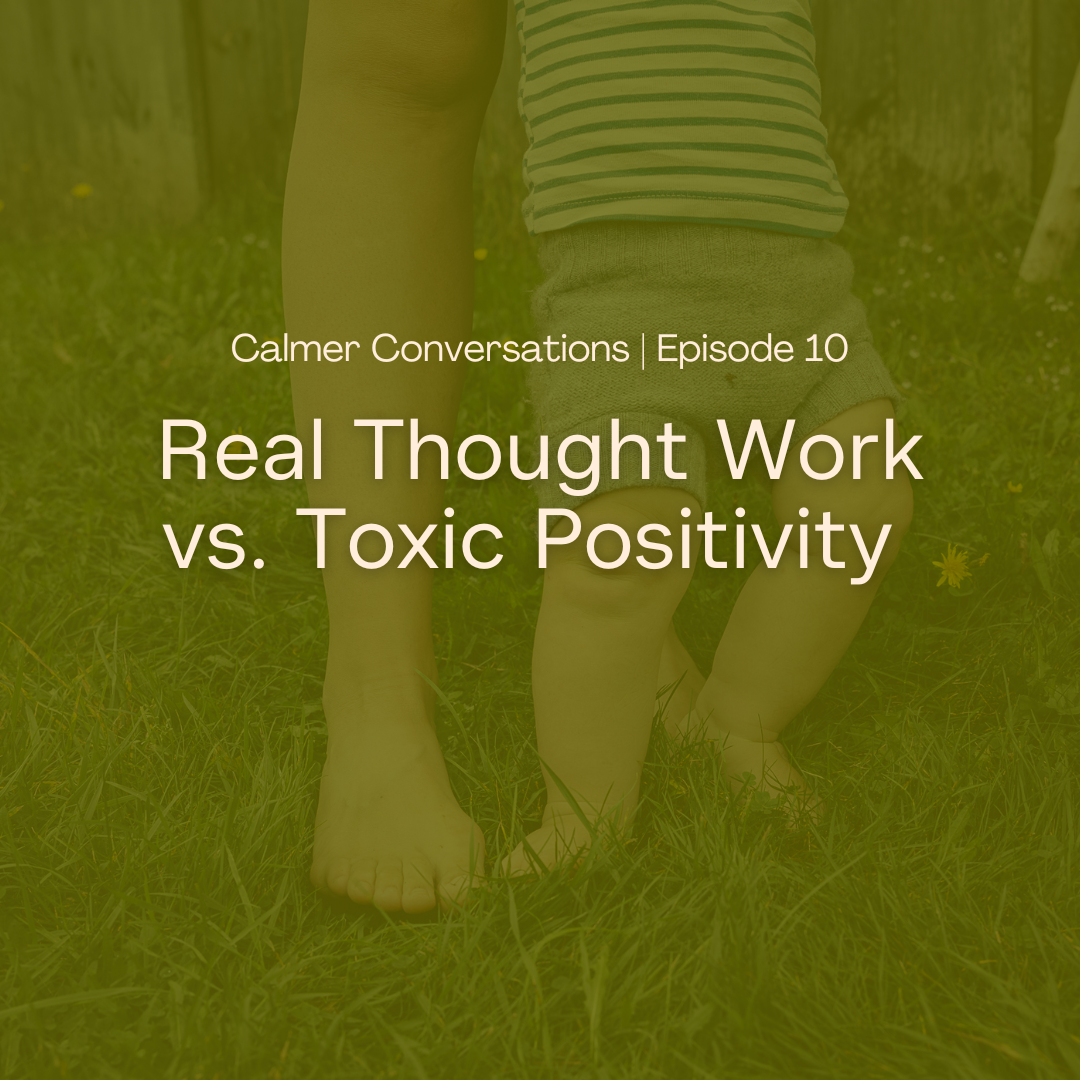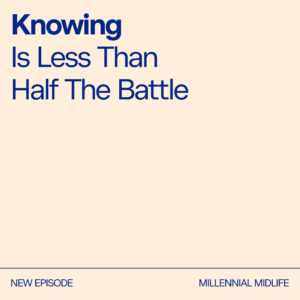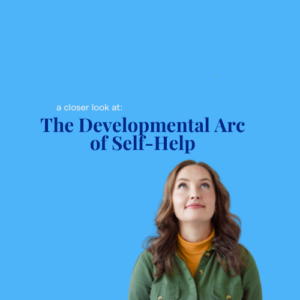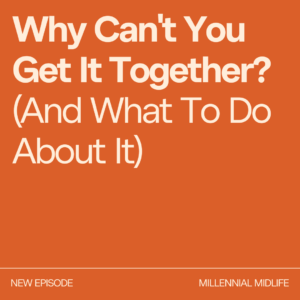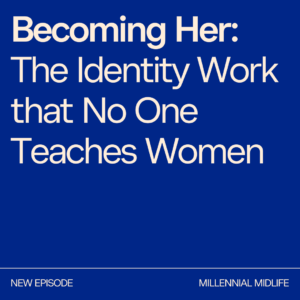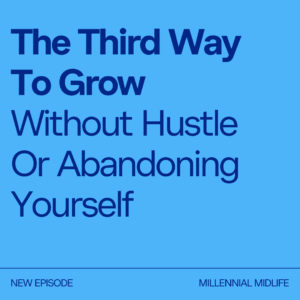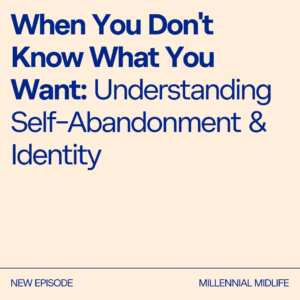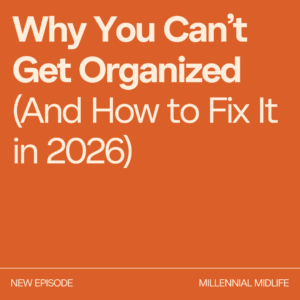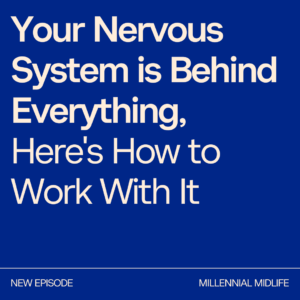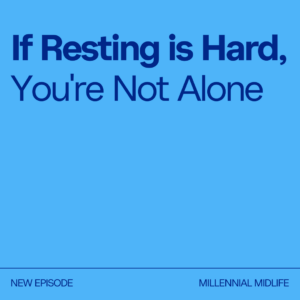Cecelia Baum Mandryk (00:02.958)
Welcome to episode number 10 of Calmer Conversations. I’m Cecilia, your host. Let’s get started. Today, I wanna talk about the difference between this work and toxic positivity. Sometimes when people find out about this work or sometimes when I get questions about this, they think that coaching or they think mindset work is really about only using positive affirmations, only always keeping a positive mindset and…
I don’t think that could be further from the truth. And really when I think about this work, I really think about how it’s an embracing of all of your humanity and all of the thoughts you have and all of the emotions you have and the entire human experience. But I understand why it can come across the other way and why people can even use this work as a new form of perfectionism, a new thing to do right. And they can start feeling really bad if they do have negative thoughts. So that’s what we’re gonna talk about today.
If that sounds like something you’re interested in, stick around. Let’s go. Okay, so first I want to talk a little bit about toxic positivity and kind of the definition of it and how it manifests or how it shows up in people’s lives, right? So toxic positivity is this belief that people should maintain positive mindset no matter how dire or difficult a situation is.
And they think this generally because there are all these studies about the benefits of being optimistic, right? And then you learn about this work. And what I’m telling you is that the thoughts you have create the emotions in your life, and they also create the actions that you take day to day, and they create the results that you see. So kind of what else is happening in your life. So that means that your thoughts become extremely important. And that’s, think, when people can take it into this place of
I need to be extreme about it. I need to only think positively all the time. And if I do think positively all the time, then my life will be better. It will be perfect. I’ll be doing it quote unquote right. And I’m someone who spent many years trying to do things right, trying to check boxes, thinking that if I did things correctly, that everything would work out for me. That if I followed the right path, that if I did the right things, that if I worked out the right way, then everything else would just kind of fall into place.
Cecelia Baum Mandryk (02:17.942)
And while I did create a pretty great life around that, it wasn’t my life and it didn’t really honor me. And I think that that’s one of the things about toxic positivity and we’ll go into some of the other problems around it, but that ultimately you end up gaslighting yourself. You end up denying yourself in your own human experience. And that means that when heart emotions come up, you feel really bad about having them. You might even feel really guilty about having hard emotions like sadness or anger or
even grief, right? You might go around. One of the other things that’s kind of challenging about it is you might dismiss others difficult feelings because you’re dismissing yours as well. And you might end up hiding them from yourself, which means you end up ultimately ignoring your own problems or ignoring what’s happening in your life, ignoring the reality of what’s going on for you. If you’ve been listening along and you’ve listened to some of the previous episodes,
That’s sort of the opposite of what we’ve been talking about, right? On a very large level, what I’ve been saying is one of the most important things about this work specifically is that you start to recognize exactly what is happening for you in your brain and in your body, what’s happening in your reality and accepting it so that you can work with it. So this toxic positivity, reciting positive affirmations, trying to keep an entirely positive mindset all the time is
not only quite harmful to you, I would argue, but it’s also nearly impossible to do. Like if you’ve tried this, and even if you’re an extremely positive person, which I think I probably fall somewhere in the middle and think that most people probably fall somewhere in the middle, it’s hard to be positive all the time. It doesn’t come naturally to most of us. And I want to differentiate between feeling this kind of like overly cheery positive and feeling at peace.
or having this more like contentment within your body. And this I think is probably a whole separate episode, this difference between like joyful happiness and contentment. But a quick kind of dive into that is I spent a number of years living in Denmark and during that time, Denmark is always routinely in the top whatever for happiest countries. And once I was there and happiness to me and I think happiness when we think of toxic positivity, usually like you,
Cecelia Baum Mandryk (04:43.64)
Think of maybe like a cheerleader or someone who’s really peppy or they’re always optimistic or they’re, they just are kind of always up. They’re like really upbeat kind of thing, or at least that’s what comes into my head. And that’s what I associate with happiness and maybe even like heading into that hedonic version of happiness of like instant gratification. I think that’s what comes up for a lot of us. But what I saw there was there was a more eudaemonic, more contentment based
happiness, this like lower lying under level contentment in life, this like undercurrent of contentment that really supported people day to day. And I’m not going to say that’s across the board for every person who lives there, because obviously that’s not true. But I think that that’s what comes across as maybe happy, or that’s perhaps a different definition of happy, right? And that I think, and I’m not speaking for Danes anymore, I’m just going to speak for this work that we’re doing, is
That is the work of accepting yourself and accepting your humanness. That kind of contentment and that kind of peace that one can get and that kind of unflappability that you can have in hard situations doesn’t come from positivity. It doesn’t come from putting like an icing of happiness over hard situations or kind of gaslighting yourself. What it comes from is it comes from being okay with the human reaction that you’re having.
So gaslighting is something that I’ve brought up a couple times. And so I want to talk about that as well. So gaslighting is, so toxic positivity goes into, like I just said, the belief that people should stay positive no matter what. And gaslighting can be when someone tries to gloss over your own experience so you can gaslight yourself or somebody else’s experience with a more positive outlook, right?
Ultimately what we’re doing when we do this when we’re denying our actual human what’s coming up for us the real thing that’s happening is We’re resisting our reality Right. We’re resisting the reality that we’re experiencing. We’re resisting the reality that somebody else is experiencing We ourselves are not accepting what’s our true experience?
Cecelia Baum Mandryk (07:05.598)
And again, if you’ve been following along and I think it’s worth diving into again here, when you start to resist things, your nervous system goes into that sympathetic state. It goes into fight or flight. It slightly moves out of regulation. And what that means is it’s much harder for you to deal with what’s happening in your life. You lose the capacity to connect with yourself and other people. You lose the capacity to think cognitively. You lose the capacity to be creative in different ways. And so well,
staying positive, maybe sounds kind of nice on the outside or like, wouldn’t life be grand if I could just be positive all the time? The truth is, is that you are here to have a human experience or you are having a human experience right now. And having a human experience means that you get the entire human experience, right? You get the happiness and you get the contentment and you get the joy, but you also get the grief and you get the frustration.
and you get the sadness and you get the anger and all of those are 100 % okay as emotions and in fact it’s very normal to feel the range of emotion and there’s nothing wrong, nothing bad is going to happen to you if you feel mad one day, right? Or you just feel a little discouraged. There’s nothing wrong that’s gonna happen and…
there’s nothing bad that’s gonna happen, right? I think sometimes when we get into the toxic positivity or again into this work, we think like, if I feel discouraged for even a day, things are gonna go totally off and I’m gonna ruin everything I’ve been doing. And that means I’m not doing it quote unquote, right. I’m not actually doing this work right if I’m feeling that. And I think again, the opposite is true in that if you are doing this work right, or you are actually just doing this work,
It means that you’re not shying away from the heart emotions. It means that you’re actually able to welcome them. And in fact, in welcoming them, that means they stick around for less time. They’re less sticky, they’re less heavy, but you’re able to accept them into your life. So I wanna unpack that a little bit, because I think that that can be a little confusing. This goes back to the acceptance episode two. When you accept something totally,
Cecelia Baum Mandryk (09:16.61)
when you’re okay with it, when you’re okay with your experience just as it is, when you’re okay with feeling shame today, when you’re okay with the discomfort of moving, for instance, right? Like what I’m going through right now, when I accept all the emotions that have been coming up for me over the last couple weeks, suddenly I can be with them and I can work with them and they pass relatively quickly. And I think there’s this other belief in toxic positivity that if you
acknowledge heart emotions, not only is something gonna go wrong or you’re like ruining what you’re doing, but that you’re gonna be stuck in them for a really long time. But in fact, it’s the resisting the emotions that keeps you stuck in them. It’s the resisting what’s coming up in your brain and your body that makes them stick around for much longer, sometimes days, sometimes weeks, sometimes years, right? So a lot of us can have emotions that we’ve been carrying around for decades.
because we haven’t had a chance to process them in any meaningful way and we’ve been ignoring them because they feel scary to us because we think they’re really big, because we think they’re gonna consume us, we think we’re gonna start crying and we’re never ever gonna stop. And so we just continually push things away and think like ultimately things will just kind of work themselves out or get better or I can positive think my way out of this. But that’s not the case. The opposite, right? So going back to…
I think I’ve even quoted this before on the podcast, but Byron Katie has this quote about reality. And it’s something like, I’m going to look it up for you right now because it’s just so great and I don’t want to. Well, I’m not going to be able to find it that quickly, but it’s something about like, if you argue with reality, you’ll lose, but only 100 % of the time. And I think that that’s
so powerful because when we deny our reality, we don’t even have to argue with it, but when we deny our reality, when we deny our human experience, we are denying ourselves, we are rejecting ourselves in some way. And whenever we reject ourselves, we put ourselves in that dysregulated stuck place. And you can watch this with children, really. I have a four and a half year old and an almost two year old right now. And I can watch when they
Cecelia Baum Mandryk (11:37.602)
have hard emotions, if we’re trying to rush them through the process, or we’re trying to deny what’s happening using logic, like, you know, because we’re adults and we have like a different understanding of what’s happening, the emotion actually sticks around for a lot longer for them and the experience becomes much bigger. But when we take the time to sit with them, we take the time to hear, you’re feeling frustrated because the magnetiles aren’t connecting in the way that you want them to.
and we have compassion for them in that moment, we actually help them understand it. I still get frustrated as a person when things don’t work how I want them to work. When I’m doing something and it’s not going to plan, I get frustrated. And they have then a framework by which to understand what’s happening in their brain and their body. Suddenly the emotions disappear so quickly, they can just let them go.
They’re not making them, we’re not making them wrong for having a feeling. They’re not making themselves wrong for having a feeling. And suddenly it doesn’t become a problem. And this plays out on our adult lives over and over again. It goes back to how we were taught to handle emotions. It goes back to this idea that we’re supposed to be positive all the time or being positive is better than just being and thinking that you have to uphold this standard to be doing something kind of correctly in the world.
So I wanna argue if it isn’t clear already against toxic positivity and this is not what we’re doing, right? We are not gaslighting ourselves. We’re not glossing over things. We’re not simply skipping to a better thought about something and using better is like an air quotes, right? We’re not skipping to a better thought about something so we can pretend to feel good because if you have not processed the underlying emotion and the real thought that you’re having before you move on to something different, then it’s still there.
and it’s still impacting you, no matter how many positive affirmations you recite. No matter how big of a smile you put on, if you have not addressed what’s happening underneath the surface, it will still impact and affect you. And so toxic positivity, I guess at its core, not only is it can be really dehumanizing and it can be really harsh, both to yourself and to other people, but it fundamentally doesn’t work.
Cecelia Baum Mandryk (13:54.762)
It just doesn’t, I don’t think you can positive your way into something. You can open yourself up and say, how could I see things differently now that I’ve acknowledged how I’m feeling and move into positivity from that way. And I think practicing positivity in that way can actually be really powerful, but that’s a more intentional practice of positivity, not just a layering on a new thought before you process your emotions. So forgiving yourself.
on being open to new thoughts, recognizing what’s happening, taking time to bring awareness and acceptance to your human experience and what you’re going through is so crucial to feeling content, to feeling calm, to feeling happy in life. It really is a path to…
being, I think I used the word unflappable early, but almost unflappable around emotions. And I’ll just say again, from my personal experience, we’ve been on a little bit of a roller coaster with where we’re moving and how the move is gonna work for the past six weeks. I’ve cried a lot, I’ve been frustrated, I’ve felt joy and excitement, I’ve felt all these different things. And because I have these tools now, they’ve just been part of the experience and none of them has gotten me hung up on things going wrong, or this isn’t what we’re supposed to be doing, or…
being mad at my partner or whatever it is, right? I’ve been able to just be with myself through this process. And I think as a result, I can see the growth that I’ve had over the last six weeks as a human, because I’ve been present for everything that’s come up for me. So that’s the benefit. And that’s the other side of toxic positivity in this work is that if you get to know yourself and accept your humanity, then all of sudden you’ll be able to love yourself. You’ll able to recognize your own.
lovability and worthiness and value no matter what is happening, no matter what emotion you’re feeling, and that leads to this calmness and unflappability. So the tool to take away here, the thing to try, is to really start to become aware of what emotion you’re having. And instead of trying to quickly escape it, recognizing that it is also a human emotion and is also entirely okay to have it, recognizing how you can start to maybe understand where it’s coming from or what story is creating it, and then asking yourself when you’re ready to move on.
Cecelia Baum Mandryk (16:04.546)
We’ll talk more about moving on from emotions in another episode, but this is just something to kind of get started. you know, toxic positivity doesn’t work. So if you’ve been engaging in that, maybe ask if you want to step away from it and maybe see if you can approach this work in a different way. All right. See you next week.

